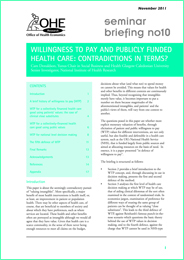Sign up to our newsletter Subscribe
Analysing Global Immunisation Expenditure

Because health care resources always are scarce, decisions about what (and what not) to pay for cannot be avoided. Deciding how to value health and aspects of health care continue to be the subject of much debate. In this Briefing, Prof Donaldson takes a thorough…
Because health care resources always are scarce, decisions about what (and what not) to pay for cannot be avoided. Deciding how to value health and aspects of health care continue to be the subject of much debate. In this Briefing, Prof Donaldson takes a thorough look at the potential role of the willingess to pay (WTP) approach as a means for valuing the intangibles in health care. He examines whether more explicit monetary valuation of benefits, through elicitation of patients’ and the public’s willingness to pay, are not only useful, buy feasible and defensible in a system such as the NHS, which is funded largely from public sources and aimed at allocating resources on the basis of need. He offer five “defences” for the use WTP in response to the primary criticisms that have been levelled against it.
Willingness to Pay and Publicly Funded Health Care: Contradiction in Terms?
Donaldson, C.
(2011) Willingness to Pay and Publicly Funded Health Care: Contradiction in Terms?. OHE Seminar Briefing. Available from https://www.ohe.org/publications/willingness-pay-and-publicly-funded-health-care-contradiction-terms/
